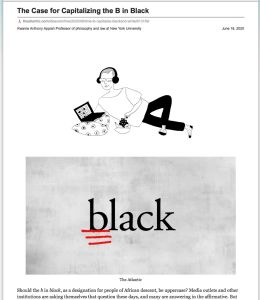
Time to Capitalize Black and White
Black and white are both historically created racial identities – and whatever rule applies to one should apply to the other.
Recommendation
Should publications capitalize “black” and “white” or, perhaps, “brown” to discuss race? Almost everyone – readers, writers, editors – has a stake in that debate. In this carefully nuanced and curated Atlantic article, Kwame Anthony Appiah outlines the controversy over using upper or lowercase letters to describe race. Professionals disagree on this. Here, Appiah advocates capitalizing both “black” and “white,” but, as Jon Allsop wrote in the Columbia Journalism Review in August 2020, “For many people, Black reflects a shared sense of identity and community. White carries a different set of meanings; capitalizing the word in this context risks following the lead of white supremacists.” Join the debate to learn a few rules you never heard about in grammar school.
Summary
About the Author
Born in London, Kwame Anthony Appiah is a British-Ghanaian philosopher, writer and cultural theorist. He holds academic positions at the Law School and the Department of Philosophy at New York University.








Comment on this summary